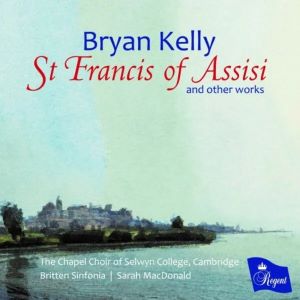
Bryan Kelly (b. 1934)
St Francis of Assisi (1981)
At the round earth’s imagin’d corners (1977)
For Adoration (2001)
Katherine Mann (soprano), Bradley Smith (tenor), Stuart MacIntyre (baritone), Morgan Pearse (bass)
Adam Field (organ, piano)
Chapel Choir of Selwyn College
Cambridge, Britten Sinfonia/Sarah MacDonald
rec. 2023, Cambridge, UK
Regent Records REGCD585 [66]
I look forward to the Christmas season every year. This is not for any religious observance but that I get to play on repeat the brilliant Improvisations on Christmas Carols by Bryan Kelly. To my mind it is the most inventive and joyous arrangement of Christmas music available. That it is available on Naxos alongside the Hely Hutchinson Christmas Carol Symphony that is saying something (review). Bryan Kelly has been a lively, though outlying presence in British musical life for over seventy years. He studied composition at the Royal College of Music in London with Gordon Jacob and Herbert Howells. Further study followed in Paris with Nadia Boulanger. He has written expertly in most genres, though as he writes in an accessible, tonal idiom his music does not appear on concert platforms nearly as often as it should. The exception here is his church music, including the popular ‘Kelly in C’ from 1965 – a ground-breaking setting of the Magnificat and Nunc dimittis, using Latin American rhythms.
St. Francis of Assisi, a collaboration with poet John Fuller, is a 45-minute work consisting of fourteen short sections, detailing some of the most important events in the life of St Francis of Assisi. The story is divided amongst the chorus and four soloists, soprano Katherine Mann as St Clare, tenor Bradley Smith as the narrator, baritone Stuart MacIntyre as St Francis, and bass Morgan Pearse as the Sultan. In the division between aria and narrative recitative the sound world reminded me of Britten’s St Nicholas or, in the use of the piano which accompanies the recitatives, the seldom-performed Canata Academica. The whole work is beautifully structured and imaginatively scored for quite a small orchestra utilising timpani, percussion, celeste, piano, and strings.
Bradley Smith has fortunately clear diction and well-controlled vibrato which is useful for carrying the narrative. Stuart MacIntyre is a friendly and outgoing, authoritative St Francis with a warm rich tone entirely appropriate for a man of the people. Katherine Mann as the sixteen-year-old St Clare brings a radiance happily devoid of naivety. The one section I felt uncomfortable with was that depicting the Sultan of Egypt. Bass Morgan Pearse is in fine voice, and I know Kelly has spent much time in Egypt, but the setting was too reminiscent of nineteenth-century orientalism for my taste. The choir are tightly controlled in the rhythmic dance-like sections and in ‘The little hooded lark’ there is a sweet lyricism in the soaring melody over a rippling piano accompaniment. I have a thing for flattened sevenths and in the penultimate section, the choir and Francis glorify God in a modally heroic hymn of praise. Sarah MacDonald directs with an obvious love for the work and gets wonderfully clear and passionate playing from all the forces.
At the round earth’s imagin’d corners was commissioned by the Sheffield Bach Choir. This is a sequence of six settings of intense religious texts from the fifteenth- to the seventeenth centuries for solo tenor, choir, and string orchestra. Saddened by the deaths of two close friends, he chose to set poems by three English authors, John Donne, Thomas Campion and Phineas Fletcher, as well as by the Scottish poet, William Dunbar. The emotional heart of the work seems to be the Phineas Fletcher setting Drop Drop slow tears. Like the final movement of Britten’s Serenade for tenor, horn and strings time seems to stand still. Kelly’s lacrimal phrases are every bit as emotive as Britten’s. Is there a passing reference to Britten’s setting of the words ‘O soft embalmer of the still midnight’? Maybe, but it is entirely in keeping with Kelly’s writing. I am so used to William Mathias’ riotous setting of Dunbar’s ‘Done is the battell on the dragon blak’ in This Worldes Joie that I found Kelly’s more lyrical version hard to get into, though I guess other listeners may not. Bradley Smith proves an ideal interpreter; his singing of Never Weather-beaten sail is a masterclass in control and emotional depth. The vocal writing overall shows why Kelly’s church music is so popular. The endless counterpoint exercises that Boulanger insisted her students followed and the weekly singing of Bach cantatas clearly paid off.
For adoration, is a set of five short anthems for upper voices and organ, written for Vaughan Meakins and the choir of the Arts Educational School in Tring. The sequence again sets a variety of well-known texts by English poets from the fifteenth- to the eighteenth centuries, together with a setting of a Spiritual text in the second anthem. Ever mindful of his performers, Kelly’s settings are quite simple, mostly being in unison with a few passages in two parts. However, he does expect the choir to have almost a two-octave range and in the outer movements a fine sense of rhythm. Sarah Macdonald knows her forces well and draws a joyous and vital performance from her performers.
I am always struck when recordings like this come out as to just why the works are not better known, and I always hope that they will be. Am I too optimistic? Kelly’s beautifully written music certainly deserves to be heard more. The sound is excellent, as is the production of the liner notes which are detailed and informative.
Paul RW Jackson
Buying this recording via a link below generates revenue for MWI, which helps the site remain free



















